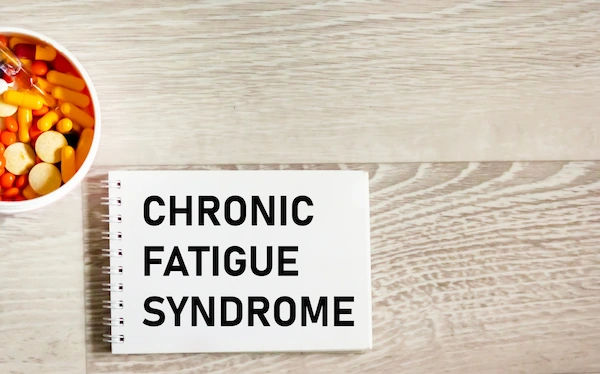Understanding Chronic Fatigue Syndrome: Symptoms, Causes, and Management
Know about the chronic fatigue syndrome, symptoms, causes, management and more.


Introduction
Do you feel exhausted all the time, no matter how much you rest? If so, you might be experiencing more than just everyday tiredness. You could be among the millions worldwide living with Chronic Fatigue Syndrome (CFS), also known as Myalgic Encephalomyelitis (ME/CFS). This complex and often misunderstood disorder is characterized by extreme, debilitating fatigue that isn't improved by rest and can worsen after physical or mental activity. This guide will walk you through everything you need to know about ME/CFS from recognizing its hallmark symptoms and understanding potential causes to exploring practical strategies for management and improving your quality of life.
What is Chronic Fatigue Syndrome (ME/CFS)?
Chronic Fatigue Syndrome is a serious, long-term illness that affects many body systems. It's not merely feeling sleepy or rundown; it's a profound exhaustion that drastically reduces your ability to function as you once did. The World Health Organization classifies it as a neurological disease. The term Myalgic Encephalomyelitis (ME) translates to muscle pain (myalgia) and inflammation of the brain and spinal cord (encephalomyelitis), reflecting the complex neurological and immune components believed to be involved.
Consult an General Practitioner for Personalised Advice
ME/CFS: More Than Just Tiredness
The fatigue in ME/CFS is often described as a pervasive, flu-like weakness that is not the result of overexertion and is not alleviated by sleep. It's a pathological exhaustion that impacts physical and cognitive function, making it difficult to work, study, and maintain social relationships. This distinguishes it from the common fatigue everyone experiences occasionally.
Who is Affected by Chronic Fatigue Syndrome?
ME/CFS can affect anyone, including children, but it is most commonly diagnosed in people between their 40s and 50s. Women are diagnosed two to four times more often than men. The CDC estimates that 836,000 to 2.5 million Americans have ME/CFS, but a majority of them remain undiagnosed. The onset can be gradual or sudden, sometimes following a viral infection, surgery, or a period of significant stress.
Recognizing the Symptoms of ME/CFS
While fatigue is the namesake symptom, ME/CFS is a multi-system disease with a range of manifestations. For a diagnosis, a patient must have a core set of symptoms for at least six months.
The Core Symptom: Debilitating Fatigue
This is a severe fatigue that causes a significant reduction in pre-illness activity levels. It is new, not lifelong, and not the result of ongoing exertion.
The Hallmark: Post-Exertional Malaise (PEM)
Post-exertional malaise (PEM) is the worsening of symptoms after even minor physical, mental, or emotional exertion. This "crash" or "payback" typically occurs 12 to 48 hours after the activity and can last for days or even weeks. This is a key feature that differentiates ME/CFS from other fatigue-related conditions. For example, a short walk one day could result in being unable to get out of bed for the next two days.
Sleep Problems and Cognitive Dysfunction ("Brain Fog")
Unrefreshing sleep is a cardinal symptom. Patients may sleep for hours but wake up feeling just as tired as when they went to bed. Cognitive dysfunction, often called "brain fog," involves problems with thinking, memory, concentration, and word-finding. You might struggle to process information or feel mentally "in a haze."
Other Common Symptoms
Many people with ME/CFS also experience:
- Orthostatic Intolerance: Feeling dizzy, lightheaded, or faint when moving from lying down or sitting to standing.
- Widespread Pain: Muscle aches and joint pain without redness or swelling.
- Sore Throat and Tender Lymph Nodes: Frequent, recurring sore throats and swollen or tender lymph nodes in the neck or armpits.
- Sensitivities: Heightened sensitivity to light, sound, chemicals, and foods.
What Causes Chronic Fatigue Syndrome?
The exact cause of Chronic Fatigue Syndrome remains unknown, but researchers believe it is likely the result of a combination of factors.
Potential Triggers and Risk Factors
For many, the illness begins suddenly, often after a viral infection like Epstein-Barr (mononucleosis), Ross River virus, or COVID-19. Other potential triggers include bacterial infections, physical trauma (like a car accident), surgery, or significant hormonal changes. Genetic predisposition and pre-existing autoimmune tendencies may also play a role as risk factors.
The Leading Biological Theories
Current research points to several interconnected biological abnormalities:
- Immune System Dysfunction: Many patients show a chronically overactive immune response, as if the body is constantly fighting off an infection.
- Neurological Abnormalities: Brain imaging studies have shown inflammation and altered brain chemistry in ME/CFS patients.
- Energy Production Issues: Problems within the cells' mitochondria (the energy powerhouses) may make it difficult to produce energy efficiently, leading to the characteristic "crash."
- Autonomic Nervous System Dysregulation: This could explain orthostatic intolerance and issues with heart rate and blood pressure.
How is Chronic Fatigue Syndrome Diagnosed?
There is no single test for diagnosing chronic fatigue syndrome. It is a diagnosis of exclusion, meaning doctors must rule out other medical and psychiatric conditions that can cause similar symptoms (e.g., lupus, multiple sclerosis, thyroid disorders, severe anemia, sleep apnea, and major depressive disorder).
The Challenge of Diagnosis
Diagnosis can be a long and frustrating process due to the invisible nature of the symptoms and a historical lack of awareness in the medical community. It's crucial to find a doctor who is knowledgeable about or willing to learn about ME/CFS. If your unexplained fatigue and other symptoms persist beyond a few weeks, consult a doctor online with Apollo24|7 for further evaluation and guidance on the next steps.
Diagnostic Criteria and Ruling Out Other Conditions
A doctor will typically use established criteria, like those from the U.S. Institute of Medicine, which require the presence of the core symptoms (fatigue, PEM, unrefreshing sleep) plus either cognitive impairment or orthostatic intolerance. The process involves a detailed medical history, a physical exam, and a series of blood and urine tests to rule out other conditions. Apollo24|7 offers convenient home collection for a wide range of tests that can help in this process of elimination.
Managing and Treating Chronic Fatigue Syndrome
There is currently no cure for ME/CFS, so treatment focuses on managing symptoms and improving quality of life. A personalized, symptom-based approach is essential, as what helps one person may not help another.
Pacing: The Cornerstone of Management
Also known as activity management, pacing involves balancing activity and rest to avoid triggering PEM. It means learning to stay within your "energy envelope." This involves breaking tasks into small chunks, alternating activity with rest, and not pushing yourself on "good days," as this often leads to a crash.
Sleep Hygiene and Diet Strategies
Improving sleep quality is paramount. This includes establishing a regular sleep schedule, creating a restful environment, and limiting screen time before bed. A balanced, nutritious diet can help stabilize energy levels. Some find relief from eliminating foods that trigger inflammation or sensitivities.
Managing Pain and Orthostatic Intolerance
Over-the-counter pain relievers, gentle stretching, massage, or heat therapy can help with pain. For orthostatic intolerance, increasing fluid and salt intake (if not contraindicated by blood pressure issues), wearing compression stockings, and moving slowly when changing positions can be beneficial.
The Role of CBT and GET
Cognitive Behavioral Therapy (CBT) can be a useful tool for developing coping strategies to deal with the emotional and mental challenges of a chronic illness. However, it is not a cure. Graded Exercise Therapy (GET), which involves gradually increasing activity, is highly controversial and can be harmful if it induces PEM. Any activity plan must be developed with extreme caution and under the guidance of a specialist familiar with ME/CFS. If your condition does not improve after trying these methods, book a physical visit to a doctor with Apollo24|7 to discuss a tailored management plan.
Living with ME/CFS: Coping and Support
Managing a chronic illness is as much about emotional and mental strength as it is about physical symptoms.
Building a Support System
Connecting with understanding friends, family, and support groups—either in person or online can reduce feelings of isolation and provide practical advice from those who truly understand.
Mental Health and Emotional Wellbeing
Dealing with the grief of lost abilities and an uncertain future is challenging. Seeking therapy from a counselor experienced in chronic illness can be invaluable for maintaining mental health and developing resilience.
Conclusion
Living with Chronic Fatigue Syndrome is an immense challenge that requires patience, adaptation, and self-compassion. While the path to diagnosis and effective management can be daunting, understanding your symptoms and triggers is the first step toward regaining a sense of control. Remember, your experience is valid. By focusing on pacing, symptom-specific strategies, and building a robust support network, it is possible to improve your quality of life and find a new equilibrium. Continued research brings hope for better treatments and understanding in the future. If you suspect you have ME/CFS, the most important action you can take is to seek out a knowledgeable healthcare provider who will work with you as a partner in your care.
Consult an General Practitioner for Personalised Advice
Consult an General Practitioner for Personalised Advice

Dr Syed Mateen Pasha
General Physician
2 Years • MBBS
Bengaluru
PRESTIGE SHANTHINIKETAN - SOCIETY CLINIC, Bengaluru

Dr. Vivek D
General Physician
4 Years • MBBS
Bengaluru
PRESTIGE SHANTHINIKETAN - SOCIETY CLINIC, Bengaluru

Dr. Syed Ismail Ali
General Practitioner
7 Years • MBBS
Hyderabad
Apollo 24|7 Clinic, Hyderabad

Dr. Madhuri Sai Sreepada
General Practitioner
9 Years • MBBS
Hyderabad
BRIGHT SMILES MEDICARE & DENTAL CARE, Hyderabad

Dr. Johnson. S
General Practitioner
7 Years • MBBS MD(Preventive and social Medicine)
Pune
Apollo Clinic, Nigdi, Pune
Consult an General Practitioner for Personalised Advice

Dr Syed Mateen Pasha
General Physician
2 Years • MBBS
Bengaluru
PRESTIGE SHANTHINIKETAN - SOCIETY CLINIC, Bengaluru

Dr. Vivek D
General Physician
4 Years • MBBS
Bengaluru
PRESTIGE SHANTHINIKETAN - SOCIETY CLINIC, Bengaluru

Dr. Syed Ismail Ali
General Practitioner
7 Years • MBBS
Hyderabad
Apollo 24|7 Clinic, Hyderabad

Dr. Madhuri Sai Sreepada
General Practitioner
9 Years • MBBS
Hyderabad
BRIGHT SMILES MEDICARE & DENTAL CARE, Hyderabad

Dr. Johnson. S
General Practitioner
7 Years • MBBS MD(Preventive and social Medicine)
Pune
Apollo Clinic, Nigdi, Pune
More articles from Fatigue
Frequently Asked Questions
Is chronic fatigue syndrome the same as just being tired all the time?
No. The fatigue in ME/CFS is severe, not relieved by rest, and significantly reduces your ability to function. It is accompanied by other symptoms like post-exertional malaise, unrefreshing sleep, and pain, which are not present in everyday tiredness.
Is ME/CFS an autoimmune disease?
While it shares features with autoimmune diseases (like a malfunctioning immune system), it is not currently classified as one. Research is ongoing to understand the precise mechanisms, which may involve the immune system, nervous system, and energy metabolism.
Can you recover from chronic fatigue syndrome?
Full recovery is rare, especially for those who have had the illness for many years. However, some people experience significant improvement and can return to work and most activities. Others may experience a cyclical pattern of relapse and remission. The primary goal is effective symptom management to improve quality of life.
What is the best diet for managing CFS symptoms?
There is no one-size-fits-all diet. Generally, an anti-inflammatory diet rich in whole foods, fruits, vegetables, and lean proteins is recommended. Many patients find it helpful to identify and eliminate food sensitivities (e.g., gluten, dairy) through an elimination diet guided by a doctor or dietitian.
How can I explain my condition to friends and family who don't understand?
It can be helpful to compare it to a well-known but misunderstood illness like multiple sclerosis or lupus. Explain that it's a neurological disease that causes severe energy depletion and that activities they find easy can leave you severely ill for days (PEM). Directing them to reputable resources from organizations like the CDC or Solve ME/CFS Initiative can also provide clarity.




